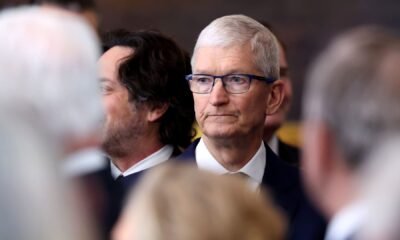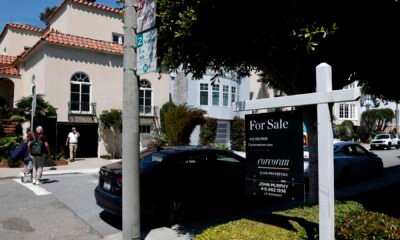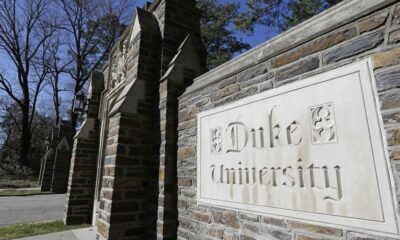Funding & Business
E.l.f. Beauty (ELF) earnings Q1 2026

E.l.f. Beauty’s profits fell 30% in its fiscal first quarter as new tariffs on Chinese imports begin to affect the cosmetic company’s bottom line.
In the three months that ended on June 30, E.l.f.’s net income fell to $33.3 million, down 30% from $47.6 million a year ago. The company, which sources about 75% of its products from China, also declined to provide a full-year revenue guide, citing the “wide range of potential outcomes” related to the new duties.
Instead, the company only issued guidance for the first half of the fiscal year. E.l.f. said it is expecting sales growth to be above 9% in the first half of the year and adjusted earnings before interest, taxes, depreciation and amortization, or EBITDA, margins to be 20%, compared with 23% in the first half of the previous fiscal year.
“We’re operating in a very volatile macro environment, obviously a great deal of uncertainty on tariffs, so until we have greater resolution on what the tariff picture looks like, we didn’t think it made sense to issue guidance,” CEO Tarang Amin told CNBC in an interview. “It’s the uncertainty around the tariffs that make things more difficult.”
The company has already raised prices by $1 to offset tariff costs and is working to expand its business outside of the U.S. and diversify its supply chain.
“We’re under 55% tariffs on goods coming from China, and we’ve planned against that,” Amin said. “So I’m just waiting for that other shoe to drop to see OK, where do they really settle out? I never thought I would see a day that I’m happy to see 55% tariffs, but it’s a lot better than 170%, so I think once we have that resolution, we’ll be in a better spot.”
Beyond profits, E.l.f. beat expectations on the top and bottom lines.
Here’s how the cosmetics company performed compared with what Wall Street was anticipating, based on a survey of analysts by LSEG:
- Earnings per share: 89 cents adjusted vs. 84 cents expected
- Revenue: $354 million vs. $350 million expected
The company’s reported net income for the three-month period that ended June 30 was $33.3 million, or 58 cents per share, compared with $47.6 million, or 81 cents per share, a year earlier. Excluding one-time items related to stock-based compensation and other nonrecurring charges, E.l.f. saw adjusted net income of $51.3 million, or 89 cents per share.
Sales rose to $354 million, up 9% from $324 million a year earlier. That marks the second quarter in a row in which revenue growth slowed to the single digits, a pattern the company hasn’t seen since 2020.
Over the past four years, E.l.f.’s sales have consistently grown in the high double digits, but that momentum has started to slow as the beauty category overall cools off following several years of outsized growth.
Amin said growth is expected to improve in the current quarter. He pointed out that the quarter’s 9% sales growth is on top of 50% growth in the year-ago period but acknowledged the category at large — and the state of consumer spending — has been soft.
“Sometimes people forget just how much we’ve been growing,” Amin said. “The category, the state of the consumer, is still challenged. There’s a lot of uncertainty with tariffs, inflation.”
While the fiscal first quarter was slower than quarters past, Amin said Nielsen data shows the company is still taking market share and outperforming the overall category.
A key aspect of the company’s growth comes from buzzy product launches, which are often “dupes” of higher-priced prestige products. It recently launched its Bright Icon Vitamin C + E Ferulic Serum at $17, which is thought to have been inspired by a similar product from SkinCeuticals, which retails for $185.
It also released a new sunscreen and just closed on its acquisition of Hailey Bieber’s beauty brand Rhode, which will launch in all Sephora stores in the U.S. and Canada in September. The effect Rhode will have on E.l.f.’s sales, and especially its launch in Sephora, won’t be seen in its results until later this year.
Funding & Business
Junk Bonds Are the New High Grade Bonds

Junk debt is about as safe as investment-grade now, at least according to prices in credit markets.
Source link
Funding & Business
German Ruling Tests London’s Status as Go-To Restructuring Hub

Funding & Business
Edison CEO Says Ready to Relist If Parent EDF Decides in Favor

Electricite de France SA’s Italian unit, Edison SpA, is ready to return to the public market if its French parent approves a plan to relist through an initial public offering.
Source link
-

 Business1 week ago
Business1 week agoThe Guardian view on Trump and the Fed: independence is no substitute for accountability | Editorial
-
Tools & Platforms4 weeks ago
Building Trust in Military AI Starts with Opening the Black Box – War on the Rocks
-

 Ethics & Policy1 month ago
Ethics & Policy1 month agoSDAIA Supports Saudi Arabia’s Leadership in Shaping Global AI Ethics, Policy, and Research – وكالة الأنباء السعودية
-

 Events & Conferences4 months ago
Events & Conferences4 months agoJourney to 1000 models: Scaling Instagram’s recommendation system
-

 Jobs & Careers2 months ago
Jobs & Careers2 months agoMumbai-based Perplexity Alternative Has 60k+ Users Without Funding
-

 Education2 months ago
Education2 months agoVEX Robotics launches AI-powered classroom robotics system
-

 Podcasts & Talks2 months ago
Podcasts & Talks2 months agoHappy 4th of July! 🎆 Made with Veo 3 in Gemini
-

 Funding & Business2 months ago
Funding & Business2 months agoKayak and Expedia race to build AI travel agents that turn social posts into itineraries
-

 Education2 months ago
Education2 months agoMacron says UK and France have duty to tackle illegal migration ‘with humanity, solidarity and firmness’ – UK politics live | Politics
-

 Podcasts & Talks2 months ago
Podcasts & Talks2 months agoOpenAI 🤝 @teamganassi





















